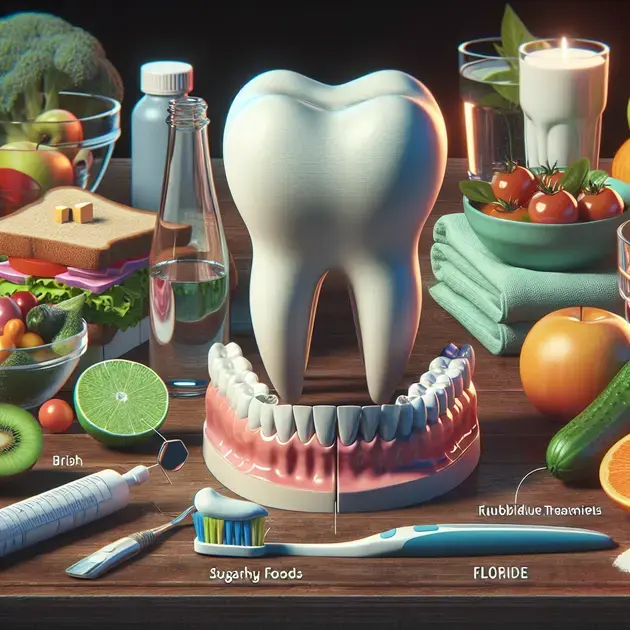Preventing cavities and tooth decay is essential for maintaining good oral health. With the rise in sugary diets and poor oral hygiene habits, the risk of developing cavities has become a common concern for many individuals.
Regular dental check-ups, proper brushing and flossing techniques, and a balanced diet are crucial in preventing cavities and tooth decay. Incorporating these habits into your daily routine can significantly reduce the likelihood of dental issues in the future.

**Effective Strategies for Preventing Cavities and Tooth Decay**
Proper Dental Hygiene Habits
One of the most effective strategies for preventing cavities and tooth decay is to maintain proper dental hygiene habits. This includes brushing your teeth at least twice a day with fluoride toothpaste, flossing daily, and using mouthwash to rinse away bacteria. Additionally, it is important to replace your toothbrush every three to four months to ensure it is effectively removing plaque and debris.
You can find more information on proper dental hygiene habits and techniques on the American Dental Association’s website (www.ada.org). They provide detailed guides and videos on how to brush and floss correctly for optimal oral health.
Limit Sugary Foods and Beverages
Reducing the consumption of sugary foods and beverages is another key strategy in preventing cavities and tooth decay. Sugars in these items can feed the bacteria in your mouth, leading to acid production that attacks the enamel of your teeth. To minimize this risk, try to choose water or unsweetened beverages over soda and limit your intake of candies and sweets.
To track your daily sugar intake and make healthier food choices, you can use the MyFitnessPal app. This app allows you to log your meals and snacks, providing insights into your sugar consumption and helping you make adjustments for better oral health.
Regular Dental Check-ups
Scheduling and attending regular dental check-ups is crucial for preventing cavities and tooth decay. Dentists can identify early signs of decay, provide professional cleanings to remove plaque and tartar, and offer advice on maintaining good oral health. It is recommended to visit your dentist at least twice a year for routine check-ups.
To make booking dental appointments more convenient, you can use the Zocdoc website (www.zocdoc.com). This platform allows you to search for nearby dentists, read patient reviews, and schedule appointments online, ensuring you stay on top of your oral health care.
Fluoride Treatments
Fluoride treatments are another effective strategy for preventing cavities and tooth decay. Fluoride helps to strengthen tooth enamel and make it more resistant to acid attacks from bacteria. Dentists can apply fluoride varnish or gel during your regular check-ups to provide additional protection for your teeth.
You can learn more about the benefits of fluoride and different treatment options on the Colgate website (www.colgate.com). They offer insights into how fluoride works to prevent cavities and which products contain fluoride for at-home use.

The Connection Between Diet and Oral Health
When it comes to maintaining good oral health, diet plays a crucial role in the overall well-being of your teeth and gums. The foods and drinks we consume on a daily basis can have a significant impact on our oral health, either positively or negatively. One key aspect to consider is the consumption of sugary and acidic foods, which can contribute to tooth decay and gum disease. On the other hand, a diet rich in fruits, vegetables, and dairy products can help strengthen your teeth and prevent oral health issues.
It’s important to note that the frequency of consuming certain foods and drinks is just as essential as the items themselves. For example, sipping on sugary beverages throughout the day exposes your teeth to constant acid attacks, increasing the risk of cavities. Opting for water as your main beverage and enjoying sugary treats in moderation can make a significant difference in maintaining a healthy smile.
In addition to watching your sugar intake, incorporating foods high in calcium and phosphorus can help remineralize your teeth and protect them from decay. Foods such as cheese, almonds, leafy greens, and fish can provide essential nutrients that contribute to better oral health. Remember, a well-balanced diet not only benefits your overall health but also plays a significant role in keeping your teeth and gums strong.
By being mindful of what you eat and drink, you can actively contribute to the health of your teeth and gums. Making small changes to your diet, such as reducing sugary snacks and increasing your intake of nutrient-rich foods, can have a positive impact on your oral health in the long run. Remember, a healthy smile starts with what you put on your plate.
The Role of Fluoride in Preventing Cavities
Fluoride is a mineral that plays a crucial role in preventing cavities and maintaining good oral health. This natural mineral helps to strengthen the enamel of your teeth, making them more resistant to acid attacks from bacteria and sugars. Fluoride can be found in various sources, including community water fluoridation, toothpaste, mouthwash, and professional fluoride treatments provided by your dentist.
Community water fluoridation has been hailed as one of the most significant public health achievements in the 20th century, as it has been shown to significantly reduce the incidence of cavities in both children and adults. By drinking fluoridated water and using fluoride toothpaste, you can help protect your teeth and prevent the formation of cavities.
When it comes to professional fluoride treatments, your dentist may recommend them based on your individual risk for cavities. These treatments involve the application of a concentrated fluoride solution to your teeth, providing an extra layer of protection against decay. Children, individuals with a history of cavities, and those with certain medical conditions may benefit greatly from professional fluoride treatments.
Regularly using fluoride toothpaste as part of your oral hygiene routine, along with drinking fluoridated water and receiving professional treatments when needed, can significantly reduce your risk of developing cavities. Incorporating fluoride into your dental care regimen is a simple yet effective way to maintain a healthy smile for years to come.
How to Properly Brush and Floss for Dental Health
Proper brushing and flossing techniques are essential for maintaining good dental health and preventing oral issues such as cavities, gum disease, and bad breath. To ensure you are effectively cleaning your teeth and gums, follow these simple steps to brush and floss correctly:
Brushing:
1. Use a toothbrush with soft bristles and a pea-sized amount of fluoride toothpaste.
2. Hold the toothbrush at a 45-degree angle to your gums and brush in gentle, circular motions.
3. Brush all surfaces of your teeth, including the front, back, and chewing surfaces.
4. Remember to brush your tongue to remove bacteria and freshen your breath.
5. Brush for at least two minutes, twice a day, preferably in the morning and before bed.
Flossing:
1. Break off about 18 inches of floss and wind it around your middle fingers, leaving a few inches to work with.
2. Gently guide the floss between your teeth using a back-and-forth motion, making a C shape around each tooth to clean below the gumline.
3. Use a clean section of floss for each tooth to avoid spreading bacteria.
4. Be gentle to avoid damaging your gums, but be thorough to remove plaque and food particles.
5. Floss at least once a day, ideally before brushing your teeth, to remove debris that brushing alone cannot reach.
Conclusion
In conclusion, the connection between diet and oral health is undeniable. What we eat and drink directly impacts the well-being of our teeth and gums. Avoiding sugary and acidic foods while opting for a diet rich in fruits, vegetables, and dairy products can significantly strengthen teeth and prevent oral health issues. By being mindful of our food choices and the frequency of consumption, we can actively contribute to a healthier smile.
Furthermore, fluoride plays a crucial role in preventing cavities and maintaining good oral health. From community water fluoridation to professional fluoride treatments, incorporating fluoride into our dental care regimen can make our teeth more resistant to decay. Regular use of fluoride toothpaste and receiving professional treatments as recommended can greatly reduce the risk of cavities and contribute to a long-lasting healthy smile.
Lastly, proper brushing and flossing techniques are essential for dental health. Following the right steps, such as using a toothbrush with soft bristles, brushing in gentle circular motions, and flossing daily, can help prevent issues like cavities and gum disease. By establishing a consistent oral hygiene routine and paying attention to both diet and dental care, we can ensure the health and longevity of our teeth and gums for years to come.